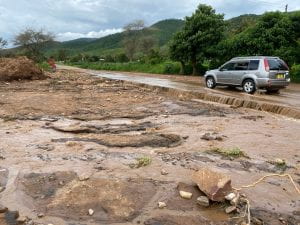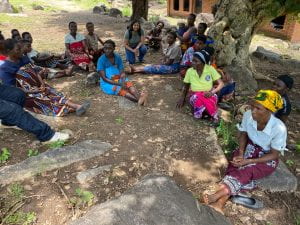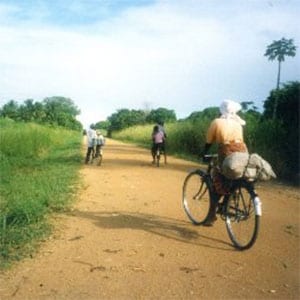Erratic rainfall patterns in Malawi are playing havoc with the lives and livelihoods of communities. Homes, businesses, roads and bridges have been destroyed in recent months following heavy rainfall. On my recent fieldwork trip to the South-eastern African country in February 2020, I saw first-hand the devastation to the landscape that heavy rainfall has caused.
Conducting fieldwork in Malawi is challenging, especially following periods of erratic rainfall. I saw much devastation to the landscape with landslides leaving roads unpassable and causing dangerous driving conditions. Driving beyond the northern town of Rumphi we travelled for an hour on a dirt track road to reach the shores of Lake Malawi. We took a boat and headed out on a 2-hour journey to reach some of the most remote communities.
On arrival in Charo Village, it was clear that the village had been ravaged and ripped apart by one of the worst climate-related disasters of recent years. In April 2019, heavy rainfall had led to a landslide bringing down boulders that swept away homes during the night. The dead were found in the lake and around the lakeshore. Out of the 13 people who died, 5 bodies remain unrecovered under boulders. This village has lost its livestock, as well as crops such as cassava and bananas. There is no electricity and fishing is the only means of survival. The people here need support.

Women, in particular, are so traumatised that they can’t sleep at night worrying if it is going to rain. They say that “they don’t have peace”. They feel anxious, depressed and experience panic attacks. They experience headaches and shivers to the extent that they feel like they are going to die. These feelings are new since the April 2019 disaster. These women tell us that before that time life was good, but they have lost everything: chairs, tables, clothes and money.
We found more harrowing stories in Mzcoto Village, an hour from Rumphi. The increases in the intensity of rainfall have led to floods, in turn causing crop loss and severe hunger. Dysentery and diarrhoea have taken hold as latrines have been swept away. The women tell us that when water comes into their homes men get annoyed and take their anger out on them and the children. Sometimes the men will “disappear” to other women due to flood-related impacts. They don’t want to be in their own flooded homes.

I was in Malawi to set up a new project funded by the Scottish Government’s Climate Justice Fund to determine what is happening on the ground in terms of gender-based violence and the psychological impact of climate change. I have the pleasure as Director of the Centre for Climate Justice at Glasgow Caledonian University to be working with Malawi-based partners Life Concern and Mzuzu University. Together we aim to develop greater understandings of the impacts of climate change and to identify practical solutions with key stakeholders to help rebuild lives, resilience and a future that is climate just.
The communities I visited are not asking for much. They just want to talk, “talking helps”. Surely we can help them do this?
Tahseen Jafry is a Professor of Climate Justice and Director of the Centre for Climate Justice, Glasgow Caledonian University.

Be First to Comment